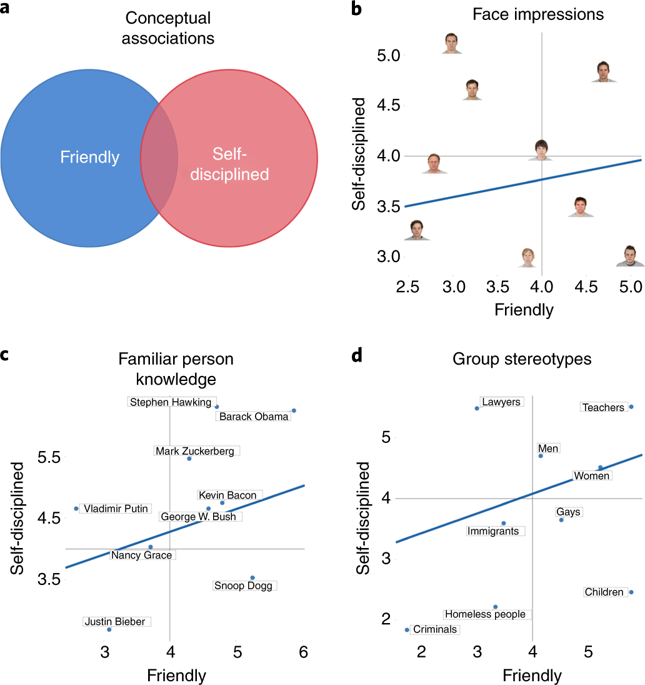Nature Human Behaviour ( IF 29.9 ) Pub Date : 2020-01-13 , DOI: 10.1038/s41562-019-0800-6 Ryan M Stolier 1 , Eric Hehman 2 , Jonathan B Freeman 3, 4

|
Researchers have noted the resemblance across core models of social cognition, in which trait inferences centre on others’ intentions and abilities (for example, warmth, competence). Current views posit that this common ‘trait space’ originates from the adaptive utility of the dimensions, predicting a relatively fixed and universal architecture. In contrast, we hypothesize that perceivers learn conceptual knowledge of how traits correlate, which shapes trait inferences similarly across domains (for example, faces, person knowledge, stereotypes), from which a common trait space emerges. Here we show substantial overlap between the structures of perceivers’ conceptual and social perceptual trait spaces, across perceptual domains (studies 1–4) and that conceptual associations directly shape trait space (study 5). Furthermore, we find evidence that conceptual trait space is learned from social perception and actual personality structure (studies 6 and 7). Our findings suggest conceptual trait associations serve as a cornerstone in social perception, providing broad implications for the study of social behaviour.
中文翻译:

特质知识形成跨社会认知的共同结构
研究人员注意到社会认知核心模型之间的相似之处,其中特征推断以他人的意图和能力(例如,热情、能力)为中心。目前的观点认为,这种共同的“特征空间”源于维度的适应性效用,预测了一个相对固定和通用的架构。相比之下,我们假设感知者学习特征如何相关的概念知识,这些知识在不同领域(例如,面孔、人的知识、刻板印象)中类似地塑造特征推断,从中出现了共同的特征空间。在这里,我们展示了感知者的概念和社会知觉特征空间结构之间的大量重叠,跨知觉域(研究 1-4),并且概念关联直接塑造特征空间(研究 5)。此外,我们发现有证据表明概念特征空间是从社会感知和实际人格结构中学习的(研究 6 和 7)。我们的研究结果表明,概念特征关联是社会感知的基石,为社会行为研究提供了广泛的意义。


























 京公网安备 11010802027423号
京公网安备 11010802027423号